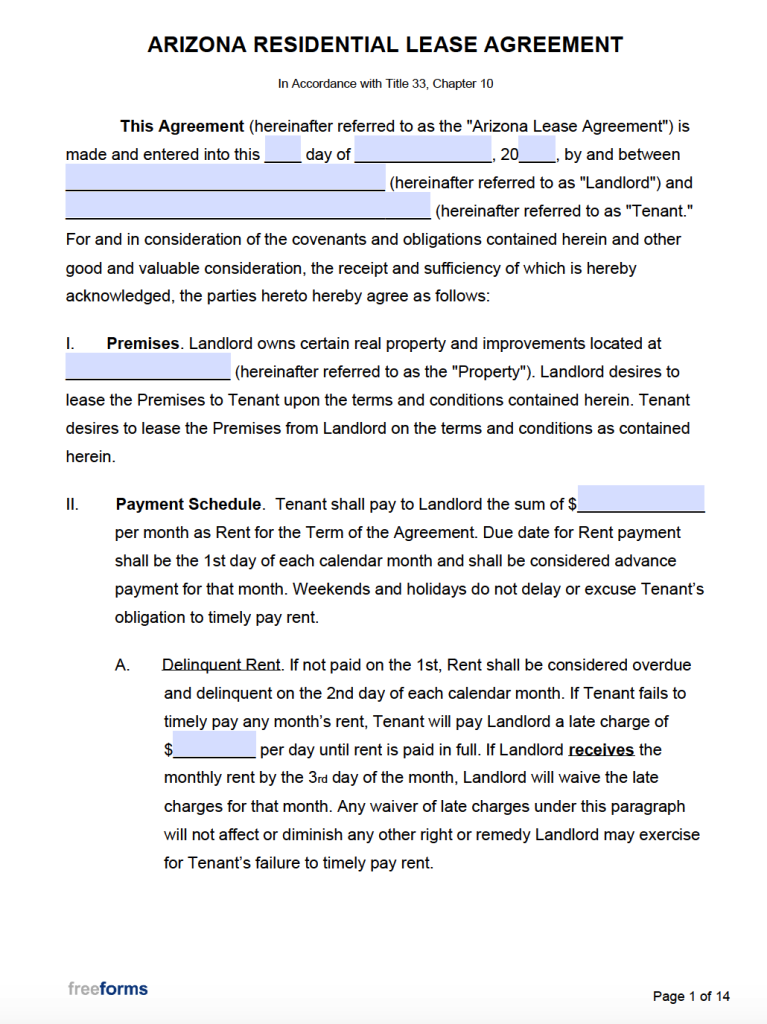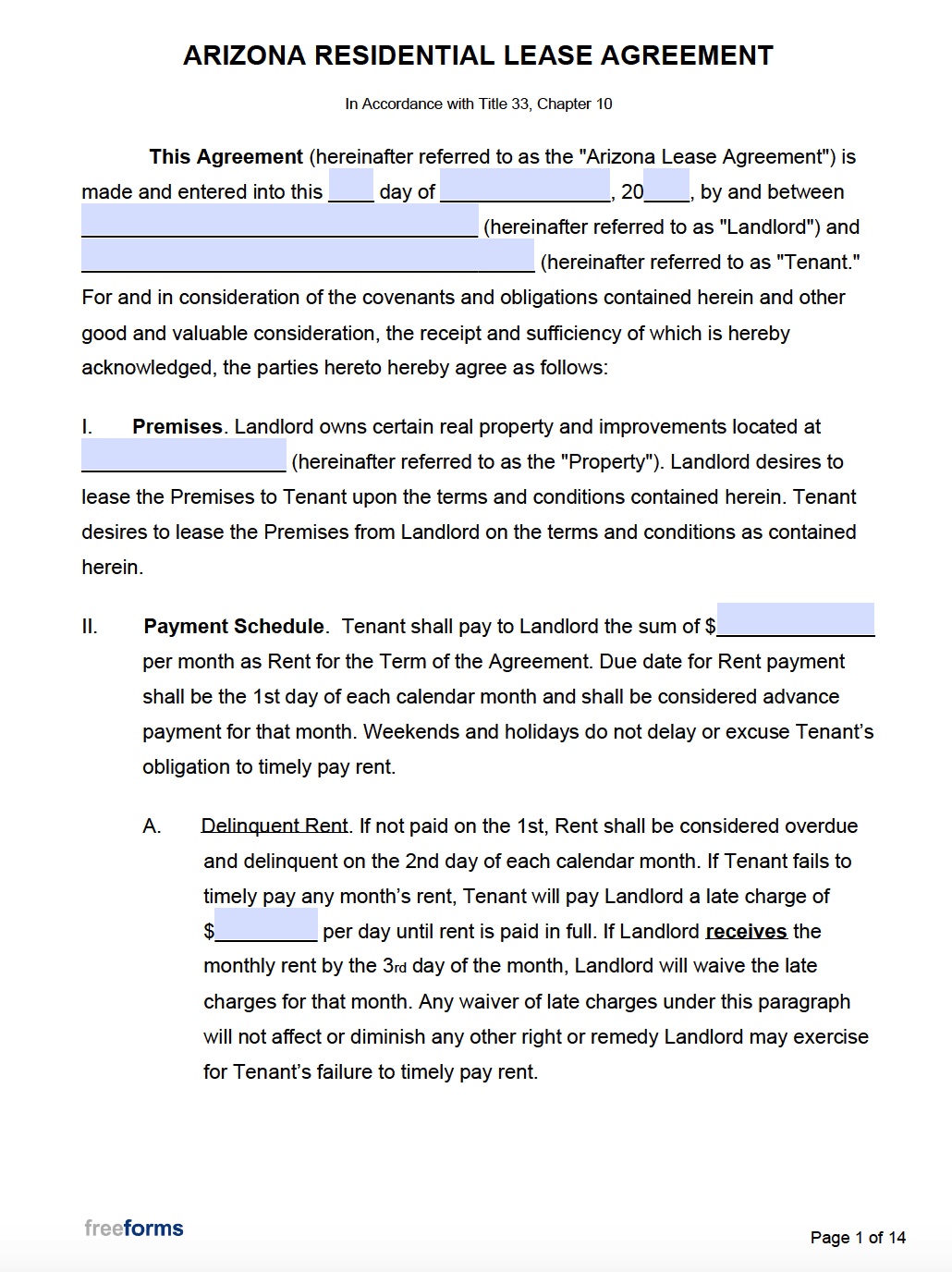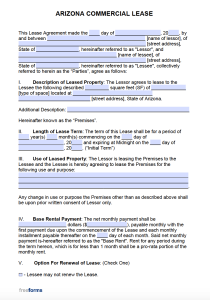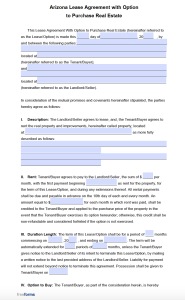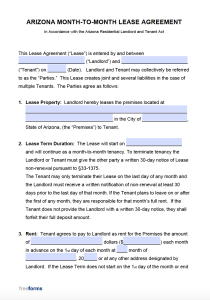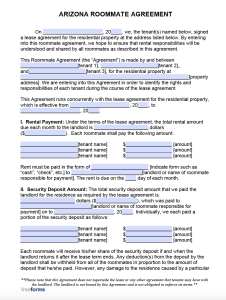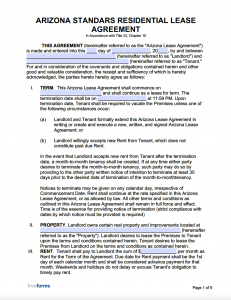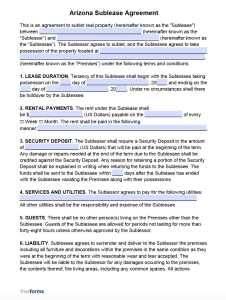Lease Agreements (6)
|
Download: PDF, Word (.docx) |
|
Download: PDF, Word (.docx) |
|
Download: PDF, Word (.docx) |
|
Download: PDF, Word (.docx) |
|
Download: PDF, Word (.docx) |
|
Download: PDF, Word (.docx) |
Required Disclosures
1.) Bed Bug Control (educational materials) (ARS § 33-1319): It is required that the landlord provide the tenant with an educational pamphlet containing useful information about the pest and how to avoid an infestation.
2.) Landlord and Tenant Act (ARS § 33-1322(B)): The landlord must provide the tenant with a copy of the Act or notify them in writing that it can be found on the Arizona Department of Housing’s website.
3.) Lead-Based Paint Disclosure (42 U.S. Code § 4852d): Landlord is required by federal law to provide a disclosure of information regarding any lead-based paint and/or lead-based paint hazards contained within the premises (if the property was built before 1978).
4.) Move-in / Move-out Checklist (§ 33-1321(C)): A document that notes any damages/defects that may be contained within the property prior to the tenant moving in, which protects them from incurring any fees for damages they are not responsible for. (Landlord must attach this form to the lease agreement.)
5.) Non-Refundable Fees (ARS § 33-1321(B)): All charges that may not be redeemed by the tenant must be stipulated within the agreement prior to tenancy.
6.) Proprietor Information (ARS § 33-1322(A)): The individual who is authorized to enter into the rental agreement must provide a written disclosure to the tenant that contains the names & addresses of any of the following that apply:
- Owner
- The person acting on behalf of the owner.
- Property Manager
7.) Rent Increase Due to Taxes (ARS § 33-1314(E)): If a local ruling adjusts the tax percentage on residential rent transactions, the landlord may increase the tenant’s payment to compensate for the higher tax rate. In order to do this, the landlord must first provide a written disclosure within the lease agreement stating that they have the right to increase the rent under these circumstances. (Thirty (30) days’ written notice is required before any changes can take effect.)
8.) Shared Utilities (ARS § 33-1314.01): Within the lease agreement, the landlord must include a full list of all the utility services that are billed individually and also clarify the cost of any administrative fees that are connected to submetering or the use of a ratio utility billing system.
When is Rent Due?
Grace Period: Rent is due at the time and place mentioned in the lease agreement (ARS § 33-1314(C)). There is no statutory grace period for standard tenancies.
Mobile Homes: There is a 5-day grace period (ARS § 33-1414(A)(4)).
Unpaid Rent: For a tenant late on rent, a landlord can send a 5-day notice to pay or quit, which demands the owed payment within five days (ARS § 33-1368(B)).
Late Fees
Standard Tenancies: There is no statutory limit on how much a landlord can charge for a late penalty. However, the landlord is limited to charging a “reasonable late fee,” which is not defined (ARS § 33-1368(B)).
Mobile Homes: There is a maximum limit of $5 per day, which can start after the 5-day grace period (ARS § 33-1414(C)).
NSF Fee
A landlord can charge a fee of $25 for a bounced check paid by a tenant (ARS § 44-6852).
Security Deposit Maximum ($)
Refundable Fees: The maximum allowed security deposit is one and a half months’ rent that can be accepted by the landlord (ARS § 33-1321(A)).
Non-Refundable Fees: There is no maximum for non-refundable fees, such as a “pet fee,” if the landlord discloses this fee in writing (ARS § 33-1321(B)).
Security Deposit Return
Return Period: The landlord must return the security deposit within 14 days, not including weekends and holidays, and must be sent via 1st class mail (ARS § 33-1321(D)).
Itemized List: If there are any deductions to the security deposit, an itemized list must be included with the returned payment to the tenant (ARS § 33-1321(D)).
Landlord’s Right to Enter
Standard Entry: A landlord must give at least 2 days’ notice to the tenant prior to entering the premises (ARS § 33-1343(D)).
Emergency Entry: There is no notice required to enter the premises for emergency purposes (ARS § 33-1343(C)).
Absence
Personal Property in Unit: If the tenant is behind on rent for at least 10 days and there has been no sign of them occupying the unit for at least 7 days, the property is considered “abandoned” (sjksjk).
Personal Property NOT in Unit: If the tenant is behind on rent for at least 5 days and there has been no sign of them occupying the unit for at least 5 days, the property is considered “abandoned” (shjjs).
Notice of Abandonment: If the property is considered abandoned, the landlord must send a Notice of Abandonment to the tenant’s last known address and place it in a conspicuous area on the rental property. After 5 days, the landlord can repossess the unit (ARS dkdjk).
Repair and Deduct
Minor Defects: For a repair equal to $300 or half the monthly rent amount, whichever is greater, a tenant can perform the repair themselves if the landlord fails to do so 10 days after being notified.
Request to Repair Notice: A tenant must give 10 days’ notice when requesting a repair to be completed (ARS § 33-1363(A)).
Tenant Breaking a Lease (Early)
Duty to Mitigate: If the tenant leaves before the lease end date, the landlord must make “reasonable efforts” after being notified to market and re-rent the premises. The tenant is only liable for the loss of rent to the landlord while the unit is vacant (ARS § 33-1370(C)).
Domestic Violence: If a tenant is the victim of domestic violence or assault, they are eligible to terminate the lease. Notice must be given to the landlord with an attached police report, which allows the lease to be canceled within 30 days (ARS § 33-1318(A)).
Active Military: If a member of the armed forces is reassigned, they are permitted to terminate a lease (50 U.S. Code § 3955).
Uninhabitable Living Conditions: A tenant can terminate a lease if the property is no longer habitable and the landlord does not remedy the situation within 10 days. The tenant must send written notice to the landlord, specifying the acts and omissions constituting the breach (ARS § 33-1361(A)).
Landlord’s Harassment: If the tenant feels that the landlord is harassing them, mainly due to excessive entry into the premises, the tenant may recover damages equal to one month’s rent and terminate the lease (ARS § 33-1376(B)).
Is an Oral Lease enforceable?
An oral lease is considered legal if it is for a period of one year or less (ARS § 33-1310(13), ARS § 44-101(6)).
Renewing a Lease
State law prohibits local towns and cities from enacting rent control policies (ARS § 33-1329(A)). A landlord can increase the rent as much as desired from a month-to-month lease or upon renewal.
Unclaimed Property
Voluntary Move-Out: If the tenant returned the keys and left the property in accordance with their lease, the landlord can dispose of the property immediately without liability.
Abandoned or Evicted: A landlord must hold a tenant’s possessions for a period of 14 days if the tenant abandoned the property or was evicted, the landlord must hold the tenant’s possessions for a period of 14 days. If no effort has been made by the tenant to retrieve the items, the landlord
Landlord-Tenant Laws (Statutes)
Refer to the Arizona Residential Landlord and Tenant Act for more information on the general provisions established by the state regarding landlord-tenant relationships.
